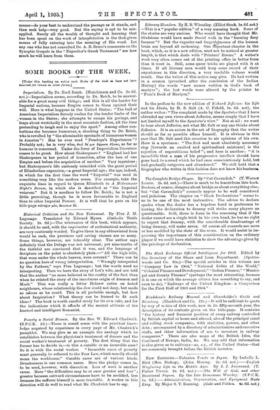Historical Criticism and the New Testament. By Pere J. M.
Lagrange. Translated by Edward Myers. (Catholic Truth Society. 2s. 6d.)—The utterances of this book, which appears, it should be said, with the imprimatur of ecclesiastical authority, are very cautiously worded. To give them in any abbreviated form would be rash, the provisoes and saving clauses are so many. Some things, however, are tolerably clear. The author says definitely that the Deluge was not universal; yet nine-tenths of the faithful are convinced that it was, and the language of Scripture on the point is absolutely plain :—" All the high hills, that were under the whole heaven, were covered." There can be no question here of wrong interpretation. "Wrongly interpreted by -the Fathers," says Pere Lagrange ; but the words need no interpreting. Then we have the story of Lot's wife, and are told that the author "no more believed in the reality of the fact than when he related the story of the incestuous origin of Ammon and Moab." This was really a bitter Hebrew satire on hated neighbours, whose relationship the Jew Could not deny, but made as odious as he could. This is all probable enough, but how about Inspiration ? What theory can be framed to fit such ideas ? The book is worth careful study for its own sake, and for the indications which it affords of the mental attitude of the learned and intelligent Romanist.






































 Previous page
Previous page